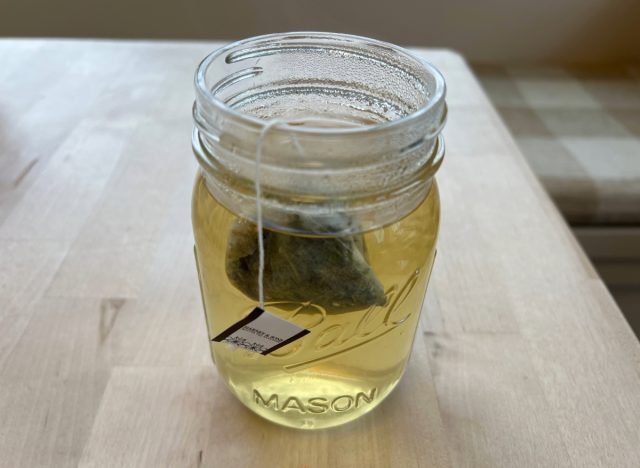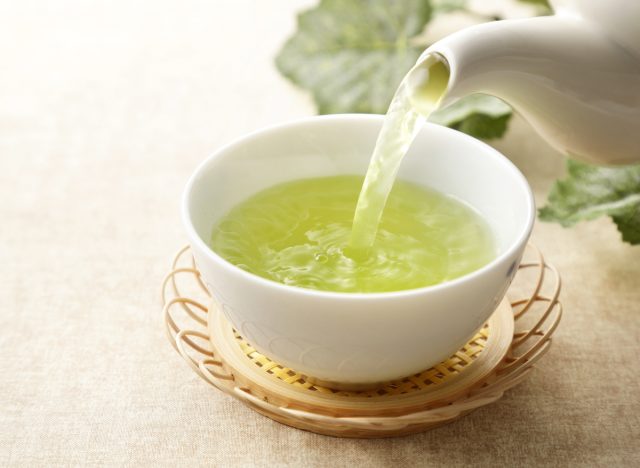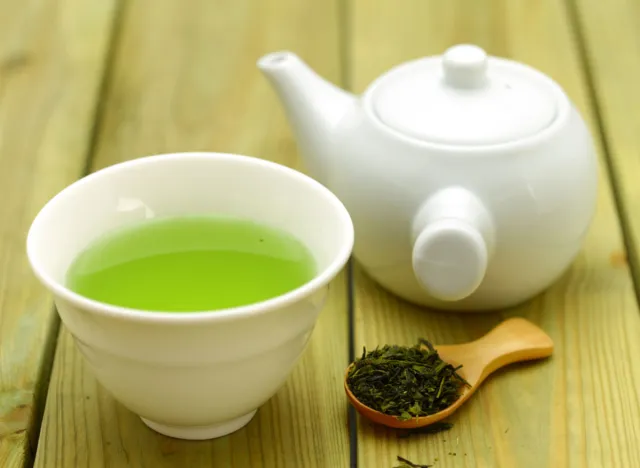There are different kinds of hot beverage enthusiasts – from coffee drinkers to tea aficionados, and then there are those who prefer the unique category of green tea. Green tea stands out for its distinct qualities that make it a delightful choice. The calming aroma gives off a spa-like vibe, while still providing the necessary caffeine kick to kickstart your day. After indulging in a 30-day green tea journey, I am excited to share my experience with you. I even made it a bit fancy by using a vintage tea cup and saucer to enhance this new daily ritual.
Consider me a hybrid coffee and tea lover. I enjoy a variety of coffee options like lattes, cappuccinos, and hazelnut iced coffee, and when it comes to tea, I usually go for black tea or a matcha latte. Green tea had never been my top choice for caffeine or go-to beverage until I decided to commit to drinking it daily for 30 days. Throughout the experiment, I started my day with a cup of green tea and continued with another in the early afternoon, making sure to cut off my caffeine consumption by 1 or 2 p.m.
Grab a cup, and keep reading to learn all about my 30 days of green tea.
I felt less anxious.


While my usual morning coffee perks me up, it also comes with side effects like feeling anxious, jittery, and on edge. Switching to green tea, however, transformed my mornings into a more serene and stress-free experience. The calming effects of green tea, from its aroma to its flavor, along with the right amount of caffeine, made a noticeable and refreshing difference in how I started my day.
The flip side to this newfound relaxed 30-day routine is that although I felt less anxious, I was not as energized during the day. This prompted me to determine just how much caffeine is in each beverage. According to the U.S. Food & Drug Administration, one eight-ounce cup of green tea contains around 30 to 50 milligrams of caffeine, compared to 80 to 100 milligrams in an eight-ounce cup of coffee. (No wonder I felt more relaxed and chill with green tea!)
To compensate for my lack of energy, halfway through my journey, I increased my consumption to three cups of green tea a day—two in the morning and one in the early afternoon—to ensure I was getting enough of the caffeine boost I needed. I think it did the trick!
The caffeine in green tea can certainly be enough to help people power through the day—it all comes down to how many cups your body needs to feel and function at its absolute best.
“Green tea contains caffeine, a natural stimulant that can temporarily boost metabolic rate,” explains Amy Goodson, MS, RD, CSSD, LD, a registered dietitian and certified specialist in sports dietetics who sits on our Medical Expert Board. “Caffeine enhances the activity of the central nervous system and increases the release of neurotransmitters like dopamine and norepinephrine. This can lead to increased alertness and a higher metabolic rate, which means your body burns more calories.”
Green tea helped me think better.


My new drink helped me think better and feel more focused on my daily tasks at hand. This was another exciting improvement compared to my coffee-drinking days when sometimes I experienced “brain fog” soon after finishing a cup of joe.
“The combination of caffeine and L-theanine, an amino acid found in green tea, may have positive effects on cognitive function,” Goodson explains. “It can enhance alertness and improve mood without the jittery feeling often associated with high caffeine intake. Some research also suggests a potential protective effect against neurodegenerative diseases like Alzheimer’s.”
It calmed my stomach.


Plain and simple, I have a lot of stomach issues. Many foods and beverages disrupt my gut health, creating havoc. Even though I enjoy the taste of coffee, it has always been a trigger. Green tea, however, proved to be a calming beverage for my stomach and overall gut issues—and for good reason. (I always drink caffeine with food, as many caffeinated beverages can cause further issues on an empty stomach.)
I discovered that green tea is chock-full of polyphenols—especially catechins—which are “powerful antioxidants,” according to Goodson. “Antioxidants help neutralize free radicals in the body (aka fight off the bad guys that contribute to inflammation), reducing oxidative stress and inflammation,” she says. “This may contribute to the prevention of chronic diseases and aging.” In fact, an inflamed gut can lead to many health issues, including nausea, constipation, and more.
Drinking green tea can also help with weight loss.


Losing weight was not a focus for me, but if it is for you, it’s worth mentioning that green tea could aid in fat-loss efforts.
“Green tea has been studied for its potential role in weight loss and weight management. It contains caffeine and catechins, which can help boost metabolism and increase fat burning. Additionally, some studies suggest that green tea may aid in reducing abdominal fat,” Goodson tells us. “Green tea catechins, particularly EGCG, have been shown to enhance fat oxidation. This means that the body may use fat as a source of energy more efficiently. This effect, coupled with increased metabolism, may contribute to weight loss or weight management over time.”
Frequently Asked Questions
How did green tea benefit you in 30 days?
During my 30-day green tea challenge, I experienced three main benefits: improved digestion, increased energy levels, and clearer skin. Drinking green tea regularly helped me feel less bloated, more energized throughout the day, and gave my skin a healthier appearance.
How much green tea did you drink each day?
During the challenge, I typically drank about 2-3 cups of green tea per day. I started my day with a cup in the morning, had another cup in the afternoon, and sometimes enjoyed a third cup in the evening.
Did you notice any negative side effects from drinking green tea daily?
For me, personally, I didn’t experience any negative side effects from drinking green tea daily. However, it’s important to note that green tea does contain caffeine, so individuals who are sensitive to caffeine should be mindful of their intake, especially if consumed later in the day.






